Sudden Death | Interview | “America’s Answer To Black Sabbath”
One of the most mysterious heavy rock / proto doom bands gets a proper reissue of their lost demo album recorded in Spring of 1972 thanks to Ancient Grease Records.
A hard-hitting and gloomy heavy rock band composed of Pasadena youth who were selected as finalists in a nationwide artist search called “America’s Answer To Black Sabbath” recorded this lost demo album in 1972. The tracks resurfaced in the mid 90s as a mysterious proto-metal record, released by pioneering reissue label Rockadelic Records. Sudden Death’s music is now being released broadly for the first time, and with full disclosure of the band’s journey.
Ancient Grease Records will ship records at the end of March 2023. The material is sourced from the master tape and made in collaboration with band members. The release includes a big format 8 page booklet and hype sticker with info. This is truly an incredible reissue that Adam of the label put together and can be shelved right next to his previous reissue of Fresh Blueberry Pancake.
Sudden Death were Greg Magie on vocals, John Binkley on bass, Joey Dunlop on guitar and Charlie Brown on drums and Catherine Hutchin (Harris) (English Cathy) was their business manager.
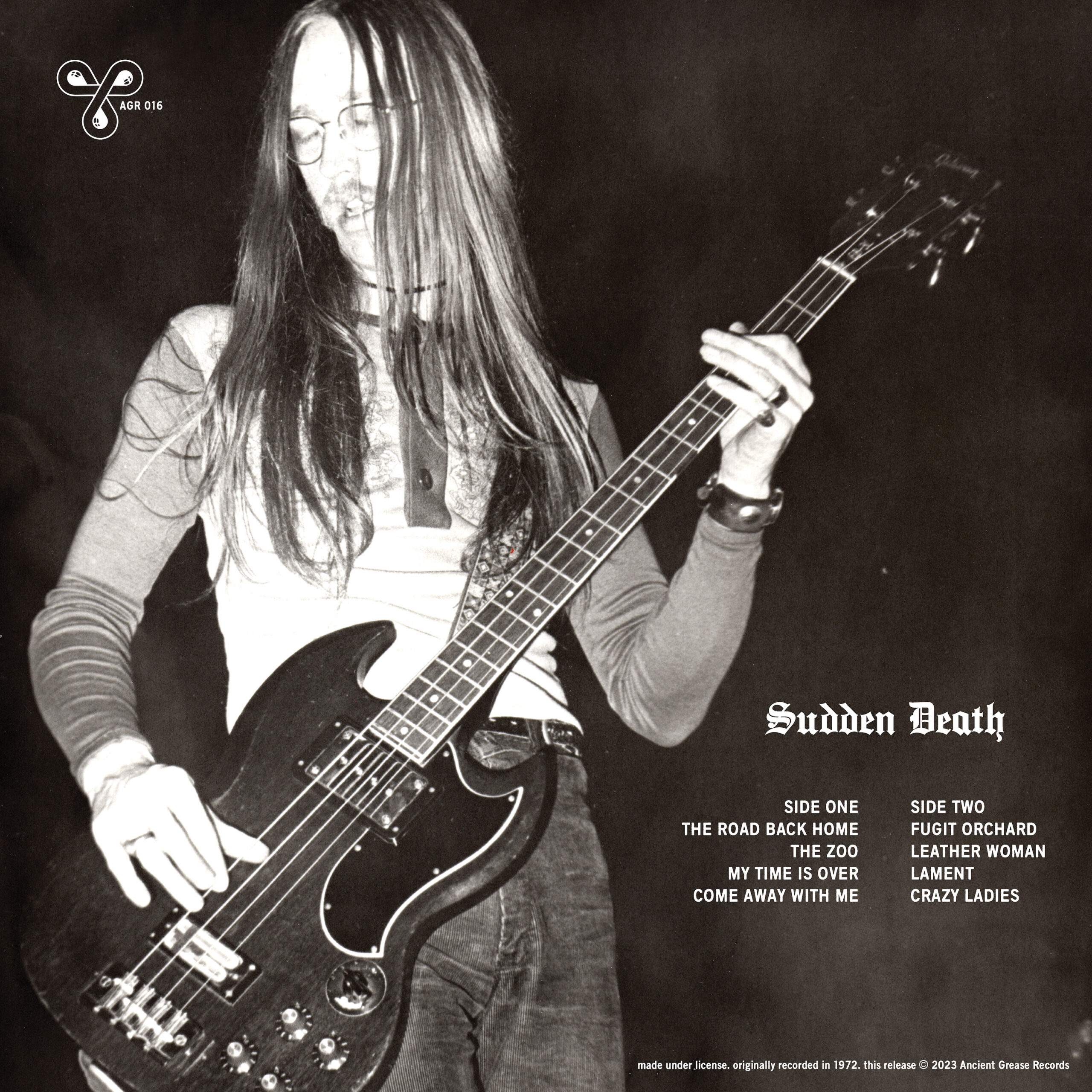
“We were just four guys exploring the world of monster riffs, heavy chord progressions and driving rhythms”
Rich Haupt of Rockadelic Records told me he was contacted by a guy in NY who had a master tape. The story was that you were a local Long Island band and Jimmy Page was sitting with you in the studio.
John Binkley: Well, when presented with a tape and there’s only a band’s name, some song titles and a rumor to accompany it, that’s not a bad story to tell.
English Cathy: Sudden Death was a Pasadena, California band through and through. The four band members in the studio were John Binkley (bass), Joey Dunlop (guitar), Charlie Brown (drums), and Greg Magie (vocalist). We had our own Jimmy Page!
John Binkley: It sounds like Rockadelic went with what they were told, even if it sounded a bit far-fetched. It was certainly better than nothing. In retrospect, Rich Haupt did us all a big favor by bringing that demo into full view of the vintage metal audience, so if a good dose of hype helped, so be it. I think the true story has more appeal since it shows how quickly fortunes can change in music, which is still true today.
For the record, Sudden Death was formed in 1971 in Pasadena from musicians in the Los Angeles area. We were homegrown and never met Jimmy Page. Joey Dunlop had worked with English Cathy in a band before I met them, and Greg Magie and finally Charlie Brown joined after me. The demo was made in Los Angeles and the only people who were with us at the recording session were the four of us in the band, plus in the control room, English Cathy (our business manager), Kim Fowley as producer, and an engineer.
Would you like to talk a bit about your background? Where and when did you grow up? Was music a big part of your family life?
John Binkley: I was born in 1950 and grew up in Altadena, California, just north of Pasadena. Both my parents had musical backgrounds; my mom and dad both played piano, and dad had played trombone in high school and college (at the University of Oklahoma).
I took piano lessons as a child until I was 10, then starting in 1961 followed in my dad’s footsteps and learned trombone, playing in fantastic music programs in the Pasadena City Schools system. I was in award winning marching bands, concert bands, orchestras, and pep bands. The Pasadena High School band and orchestra competed in regional marching and concert competitions every year, released recordings of concerts, and even toured. We were challenged to strive for perfection in our performances, and it required a high level of dedication to meet expectations. It was exhilarating and everyone involved loved it. The music program defined my high school experience.
I got into popular music just before the Beatles became the rage. I thought it would be fun to learn to play along, but we only had a plastic ukulele in the house. I couldn’t figure out how to tune it or play chords, so I started plunking along with Paul McCartney bass lines. Being a trombone player made picking out walking bass lines in popular songs a snap, and I was hooked. I was passionate about music and regularly recorded songs off the radio onto reel-to-reel tape. By 1967, when I was a senior in high school, I had dozens of tapes with hundreds of songs, and I had taught myself to play along with bass lines by ear to most of them.
By then, I had progressed to playing bass parts on a cheap acoustic guitar. I had learned that bass guitars only had 4 strings, so I took off the high B and E strings. A few years later I met a guy who liked to rebuild acoustic guitars, so he offered to trade a hollow-body Kay electric bass for my guitar.
I had no amp, so my dad rigged up a spare hi-fi amplifier so I could plug into it, and that’s when I got really serious. I’d play a record through one channel of the amp and the Kay through the other and work for hours to become indistinguishable from the recorded bass line on hundreds of songs.
My first real amp was a Sears Silvertone Twin-twelve combo that I bought from a local barber. That amp and the Kay were what I was using when I got involved in my first bands. When Sudden Death formed and began gigging, I bought new equipment: a Gibson EB-3L (picked to be a match to Joey’s SG) and an Ampeg BT-125 with an Ampeg 2×12 cabinet. That was my setup for Sudden Death’s lifetime.
English Cathy: I was born and raised in England, South London to be exact. I always loved music and with the introduction of American music (via Radio Luxembourg) I became involved with a couple of R&B bands: The Jim Berry Group and The Glorious 39th.
In 1967 I moved from swinging London to the West Coast of America where everything seemed to be peace, love, dope, sex, and Hare Krishna. After a brief modeling career I became involved with a young band named Timeless Evolution. I heard them at a party and started booking them around Pasadena. Joey Dunlop was the lead guitarist, Sam Jones on vocals, Robert Wilson on drums and Mark Dragavon on bass. They were all 16 and 17 at the time. Being as there was another Kathy in our circle I became “English Cathy” and it has stayed with me over the years.
Joey Dunlop was born in Fall River, Massachusetts and moved to Pasadena with his parents at a young age on the advice of doctors due to asthma. This proved to be very useful during the draft!! That is another story!!!! He always loved music.
When did you decide that you wanted to start writing and performing your own music? What brought that about for you?
John Binkley: That sense progressed rather rapidly after Sudden Death was formed in 1971. Joey had written a few songs, and we were all inspired by the music we listened to: Deep Purple, Black Sabbath, Uriah Heep, Pink Floyd, Led Zeppelin, Jethro Tull, Procol Harum, et cetera. Our jams led us to naturally discover the musical foundations for original songs and it just evolved from there: a product of collaborative experimentation. It seemed rather easy and natural.
English Cathy: As a teenager Joey started jamming with boys in the Altadena and Pasadena, California, neighborhoods. This was about 1968.
Were you (or other members) in any bands before forming Sudden Death? What kind of material did you play? Any recordings? After doing some research I found the band The Sot-Weed Factor.
John Binkley: I had been in one Pasadena-based band, a serious effort to be a rhythm and blues and soul band, led by a gifted singer named Art Jones. I had no idea what I was doing. I wasn’t familiar with the repertoire and was still struggling to understand the fretboard. We played a few parties in people’s homes, and nothing was recorded. There was nothing else until the events that led to the formation of Sudden Death.
The Sot-Weed Factor, I believe, was a Tucson-based precursor to Hammerhead that Jeff “Austin” Addison played in. No one in Sudden Death was involved.
English Cathy: Joey was in a band called Timeless Evolution. I was at a party in Pasadena in 1968 and was just leaving when I heard a band playing ‘Green Onions’. I turned around and went and listened and thought they were really good. They played mostly originals and were a hard rock/blues band.
I started managing them and they played various gigs including a Battle of the Bands, which they won. Through my dear friend Leonard Brown we were booked to perform live on his radio show on KPFK Los Angeles, Pacifica Radio, in 1969. I have a recording of the show, and I am getting it transferred to a CD or MP3! They were all still teenagers at that time. It was great!!!
Can you elaborate the formation of Sudden Death?
John Binkley: Around 1969 (a year or two after graduating from high school), Tim Lavrouhin, who was a drummer in the Pasadena High School band, and I became friends while attending Pasadena City College. He learned I was playing bass and recruited me to do some jamming despite not having a guitar player or singer. Tim had a house in Altadena with a small basement and we set up shop there. He had a basic set of drums and I had my Kay bass and the Silvertone amp. We learned top-40 and heavy rock songs as best as we could, and were occasionally joined by a buddy of Tim’s on guitar, but it was just for fun.
English Cathy: Then one day Joey was playing guitar at home and heard someone playing drums next door.
John Binkley: That introduced us to Joey Dunlop. Joey jammed with us a couple of times and suggested we start a band. He was coming out of Timeless Evolution and had enjoyed some local success and he wanted to keep moving forward with his music. From that moment on, the band became a kind of laboratory that was to thrust all of us into rapid development as musicians.
And make no mistake about it. Tim and I were in awe of Joey. I had gone to concerts and seen The Beatles, Cream, The Who, Hendrix, Pink Floyd, Jefferson Airplane, Vanilla Fudge, Iron Butterfly, and others. Joey encapsulated the energy, the style, and the sheer power of bands that we idolized. From the moment we met him, we felt like there was something incredible going on. It wasn’t just fun to play songs with him, it was staggering to be in his presence. All he had to do was lead the way and Tim and I eagerly followed in his footsteps. It was like an accelerated master class in acid rock for us now, and we loved it.
Joey brought in English Cathy, who had managed Timeless Evolution, to handle our business and provide guidance to refine our style and direction. With her help we found a singer, Marcie, and we started gigging. The band was getting progressively heavier thanks to Tim’s growing mass of drum equipment, Joey’s rapid transition to inspired guitarist, and my figuring out heavy bass lines on the fretboard. But nothing was really clicking yet.
Marcie was more of a blues singer and that wasn’t fitting in with our rapidly revolving metal style. English Cathy suggested bringing an acquaintance of hers from England to front the band. We all thought that having a British import as a singer would make us unique. That was Dave Westwood, but he didn’t work out, either. By this point we had left Tim’s basement and were rehearsing in the home of friends in South Pasadena, an ideal location because it was a hillside house that had a downstairs rec room that opened onto a canyon. A perfect rehearsal environment which quickly gave rise to frequent parties.
We eventually found Greg through Musicians Contact Service in Hollywood and everything seemed to be on track, but then Tim quit the band, so we started auditioning drummers without much luck. We found Charlie Brown when I was driving home from a practice through nearby Eagle Rock. I noticed a hippie-looking guy pushing a Volkswagen Beetle down the street, so I offered to push him with my car to a gas station. The back window of his car was blocked by drums, and after a brief chat that must have seemed really weird to him, I recruited Charlie to audition with us. Thankfully, he followed through, and his audition was stunning. Both Joey and I felt like Charlie was reading our minds rhythmically, and we were really worried that Charlie wasn’t going to want to join. But he did, and with that the band was assembled. That would have been in 1971, about two years after I had first started jamming with Tim.
Charlie, it turned out, had no background as a rock drummer; he had primarily been in country-western and pop bands. He told us later that at the audition he had no idea what we were doing, so he just tried to keep up and maintain a solid beat. It turned out that his natural instincts fit squarely into our musical pocket, and the energy just soared. What a stroke of luck.
How did you decide to use the name “Sudden Death”? What influenced the band’s sound?
John Binkley: I don’t remember how we came up with the name. We have to have come up with it while Marcie was with us because we never performed under any other name that I recall. I know I immediately thought it was a good name because televised golf tournaments often ended in ties decided by a sudden death playoff, so I thought it would give us free publicity.
My personal stylistic and sonic influences were Jack Bruce, Tim Bogert, John Entwistle, Paul McCartney (I saw The Beatles at the Hollywood Bowl but couldn’t really hear Paul over the screaming crowd), Roger Glover, and Geezer Butler, to name a few. I was completely self-taught on bass, learning by ear to play the bass parts on every song on every album I bought, and had always strummed with my thumb. Tim Bogert’s rapid fire bass lines were causing me problems, so I went to a Vanilla Fudge concert armed with binoculars to see how he did it. I came home and started learning to pluck overhand with my fingers after that. Never used a pick.
English Cathy: The band was heavily influenced by Deep Purple and especially Richie Blackmore, among others.
John Binkley: We were also into Black Sabbath, Led Zeppelin, Uriah Heep, Jimi Hendrix, The Who, and Humble Pie, and went to see them live whenever we could. I saw Black Sabbath at the Whiskey in Hollywood, and no one came away from shows like that without inspiration. The early 70s were too much.
Was there anything released prior to the Rockadelic issue of your lost recording?
John Binkley: Nothing that I’m aware of. It was the only recording that Sudden Death ever did. I had assumed the Epic demo had been buried in the CBS archives. I had been trolling the Internet from time to time starting in 1995 and had turned up nothing until I found the Rockadelic website in 2006. Thank goodness for search engines.
English Cathy: Not as far as I know.
‘Suddenly…’ was issued in 1995 by Rockadelic. What can you tell me about the recordings? How many demo copies were there originally?
John Binkley: No one from Sudden Death was involved with the Rockadelic release, not that I’m complaining. No one at Rockadelic knew anything about the source of the tape, so how could we have been involved? All I know about their release is what I learned in a phone conversation I had with Rich Haupt back in 2006. If I recall correctly, Rich said they sold around 600 copies of the demo on vinyl and considered it a success. He still had the tape that was sent from New York, which had been used to cut the master for their release, and a single copy of the ‘Suddenly’ album, and he sent both of them to me, along with a CD of the album.
English Cathy: As for the Epic demo itself, I am not sure how many were burnt but Kim Fowley and Michael Sunday were shopping it.
John Binkley: Since our demo was made as part of a rather broad effort by Epic to find new hard rock talent, a lot of internal copies may have been generated. I assume there may have been several first-generation copies of the mixed down demo, made from the master we recorded in the studio. From those, second-generation copies may have been made for those at Epic and CBS who were working with Michael Sunday and Kim Fowley. And there were additional copies that were given to the band.
I had a quarter-inch, reel-to-reel copy of the demo given to me shortly after the session with Epic, but it disappeared during the years I was living in Hollywood (1973-1982) and I had never made a copy of it for safekeeping. It would be over 25 years before I would hear our music again, thanks to Rich and Rockadelic.
I’ve held on to the tape Rich sent me in 2006 but never listened to it because I don’t have a reel-to-reel machine. However, I know now that the tape definitely is the Sudden Death demo. There is reason to believe that the tape might be a product that is very close to the studio master. It may even be a direct mix from the master. It’s quarter inch tape on a 10-1/2 inch reel. The box the tape is in doesn’t appear to be the original box. It’s marked with the name of another Rockadelic band. However, there’s a sheet of paper that’s the unprinted side of the form used in a studio to record the individual instruments on each discreet track of a song’s master. It has been glued to the outside of the tape’s box and has handwritten notes of the times, number of takes and, most importantly, the real titles of the songs. The fact that the actual song titles we used are on that sheet associates it with the original demo. If we assume that the track list arrived with the tape, then Rockadelic, for reasons of their own, gave new titles to several songs when they printed the album cover.
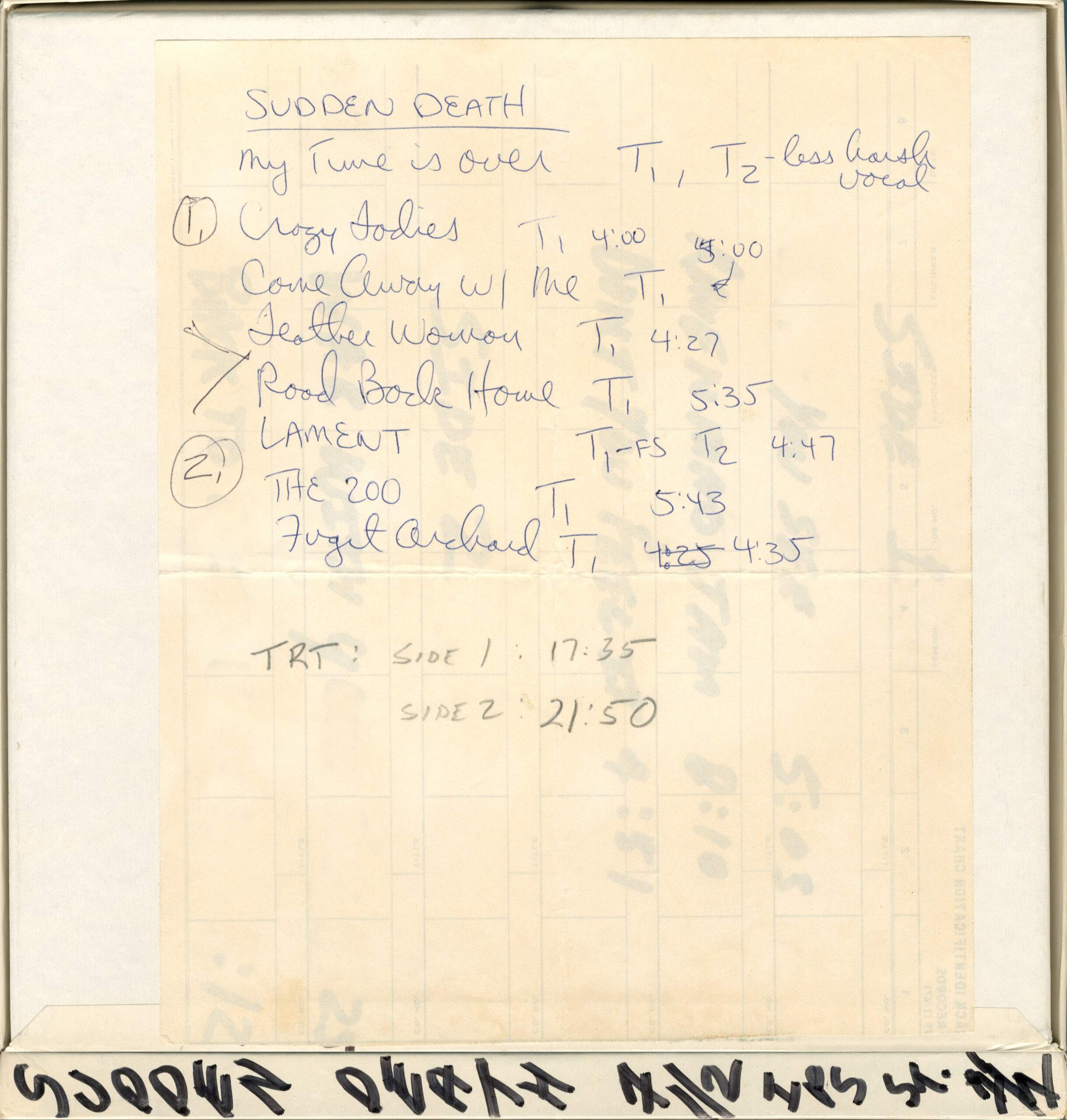
“Kim Fowley came to hear the band and really liked them”
What’s the story behind it? Where did you record it? What kind of equipment did you use?
English Cathy: Kim Fowley came to hear the band and really liked them. He brought in Michael Sunday, who was in Columbia A&R with Epic Records, and before we knew it we were in Columbia Studios on Sunset Strip.
John Binkley: Kim Fowley had been brought to the South Pasadena house to hear us by Terry Brent, a drummer from the Santa Monica area who had heard the band. Kim was intrigued with our material. Michael Sunday was heading an Epic-backed search for “…America’s answer to Black Sabbath” as they put it. Kim knew of Michael’s search and brought him to the house to hear a Sudden Death rehearsal, and that was all Michael needed. Within weeks we were booked for a recording session to create the demo.
English Cathy: We were in a state-of-the-art studio at Columbia Records on Sunset Blvd. I remember that Andy Williams was recording in the next studio. The band used their own equipment.
John Binkley: The session was held in early 1972, March, I believe. The Columbia complex covers several blocks and is closed to the public. We all arrived separately. You had to drive up to a guard gate and identify yourself. The guard checked his list and knew the band’s name, the reason you were there, and then provided directions to the building we would use, instructions on parking, and how to get our equipment into the studio. Joey had his Vox Beatle amp, cab and Gibson SG, I my Ampeg BT-125, cab and Gibson EB3-L, Charlie his drums, and Greg brought my homebuilt Theremin.
We were brought into a studio that was large enough to hold a full orchestra. It had a high ceiling and was cluttered with risers, music stands, sound baffles, chairs, and other assorted gear. We cleared out an area in the center of the room with about 15 feet and several baffles between Joey and Charlie. The engineer decided that I should go direct, so even though I had set it up, I didn’t use my amp. I sat on a stool near Charlie. Greg was put into a small sound booth. They set up mikes, handed out headphones, checked levels, and, when everything was set and we could all hear each other, they dimmed the studio lights down to an atmospheric twilight.
In the control room was our producer, Kim Fowley, along with an engineer and English Cathy. With everything set, we went to work.
English Cathy: I remember being very impressed with Kim, a brilliant producer. He really came into his own in the studio.
John Binkley: Essentially, the demo is a live recording. There was no overdubbing done, at all. Song by song, we worked through the set of 8 songs we had decided to record. The atmosphere was relaxed so we worked rather methodically, song by song. We’d make some quick decisions about a song’s arrangement if it usually included an extended lead, then we’d play enough of the song to give the folks in the control room an idea of what to expect, then we’d do a take. According to the tracklist on the demo tape’s box, all the songs were done in a single take except for ‘My Time Is Over’ and ‘Lament,’ which had two takes. We took our time and patiently went through the process, but we made every effort to treat it as a live performance. With no overdubbing to be done, there was little room for error. We had to get it right. This was our big chance to impress powerful people.
For me, it didn’t help that I was sick with pneumonia and had been ordered to spend 3 weeks in bed to recover. My concession to my ailment was to spend several hours in the studio sitting on a stool rather than standing. I recovered.
When the session was over, we didn’t even listen to the recording. We packed up, headed home and waited for whatever was going to happen next.
Was there a certain concept behind the album?
English Cathy: No. Not as far as I remember.
John Binkley: If anything, we just wanted to put forth our best material, show some versatility, and treat it like a live performance set. We picked 8 songs from our repertoire of originals, which wasn’t much larger, and put them together the way we would play them as a set. We deliberately included 2 slow songs to counterpoint the high energy rockers, but that was about it. Start with a good warm-up and then let loose. We always closed our shows with ‘Fugit Orchard’ so it was a given we would end the demo with it.
Would you share your insight on the album’s tracks?
John Binkley: In 2006 Rich Haupt sent me the tape he got from New York, and it has a hand-written tracklist pasted to the box, so I’ll go through the songs in the order they were recorded.
‘My Time Is Over’
John Binkley: Sudden Death practices were largely devoted to jamming. In effect, we rehearsed jamming. Not that we were trying to work out refined, well-defined leads for each song. Instead, someone would start with an improvised riff or chord progression and then we’d devote 15 or 20 minutes to see where it took us. Anything could happen. The only rule was keep it going, and keep trying new things, but we would periodically try to bring things back to where we started, then go off in new directions. This was fun, and it refined our overall style and our ability to seize nuances and pick up on stylistic cues.
As a practical benefit, it was a simple matter to try out pieces of an original by introducing them to the group as a basis for a jam, and then see if it “worked.” Plus, things would happen in a jam that could be extracted for use in songs under development. It was a pretty good system that resulted in a survival of the fittest evolution of grooves.
‘My Time Is Over’ kind of followed that path. Joey created the basics of the song as something to jam to, and over time it became its own entity with a fleshed out arrangement. We were playing it as a warm-up instrumental at practices, and it occurred to me that if it had words we could start performing it. So I sketched out some lyrics about a rehabilitated convict and gave it to Greg, assuming he’d take the hint and write something. Instead, he immediately started singing my lyrics, and just like that we started performing the song. The lead always felt a bit “jazzy” to me, and Joey came up with the great transition out of the lead and back into the main song. When we recorded the demo, Charlie improvised the triplets at the end of the song in the studio, a nice touch that forever remained part of the song afterward.
‘Crazy Ladies’
John Binkley: I get to take credit for this ode to groupies. ‘Crazy Ladies’ may have been the only energy song we ever wrote that had a fixed structure from start to finish. It emerged from a single jam that we did at the house in South Pasadena. During the jam, I hit on the riff that’s now behind the call and response vocals and Joey quickly picked it up in unison with me. Then we’d launch into a series of chords, which I worked out by shouting them out to Joey as we continued playing, then back to the riff, then off into another chord progression idea. We didn’t stop until I felt the song was basically arranged. I added the introductory riff, refined the arrangement and the song was done. The lyrics were inspired by the days ahead when groupies would flock to our shows. My vocals over the riff were sung into my own mic while playing the song. No overdubbing. And, for the record, my biggest flub on the demo is front and center going into the chord progression on the final verse. Nobody’s perfect!
‘Come Away With Me’
English Cathy: ‘Come Away With Me’ was written by Joey for me. It was an extremely heavy time with Joey being up for the draft. I was a draft counselor and after much ado and heartache we got a 4F deferment based on his childhood asthma! It wasn’t easy and Canada was looking like an option!!! The late sixties/early seventies were extremely heavy years. A lot of these song lyrics reflect the times we were living in.
John Binkley: Like ‘Fugit Orchard,’ this may have been written before Sudden Death. As rooted as we were in acid rock energy, it was remarkable that we could shift gears into something this laid back. Really romantic stuff, and I’ve always marveled that Joey and Greg had the depth musically to pull it off. Joey’s guitar work is so different from our more typical style, and Greg’s vocals are so expressive. In its own way, this was one of our strongest showcase songs.
‘Leather Woman’
John Binkley: This is Greg’s song about biker chicks. It kind of appeared out of thin air, most likely through a bit of collaboration with Joey, but Greg may have had it in his bag of tricks before we met him. It didn’t evolve out of a jam like most of our material. I gave it an intro on bass using the line from the verse. The strength of the song was in its dance tempo and the relative control we (especially Joey) maintained throughout. A rarity with two leads, and another (besides ‘The Road Back Home’) with a non-standard ending. I thought this song had the potential for airplay, especially if we took out one of the leads. At the end of the song you can hear Greg playing the theremin just to add to the chaos.
‘The Road Back Home’
John Binkley: This was one of my first songs. I wanted to come up with music that Joey would want to play, so I went after energetic riffs and power chords. Joey nailed the feel and the song took off from there. I wrote the words in a deliberate attempt to tell a tale of lessons learned the hard way, and to have a bit of supernaturalism mixed in. You know, that spooky feeling you get when you wake up from a dream in which you did something you know was very, very wrong. I love the song, and the band jumped all over it. Live, the lead would go on forever, but we kept it short for the demo. This song has stayed fresh in my mind through the years, but no other band I’ve been in has ever performed it. Personally, I was never happy with the abrupt ending, but it never failed to go over great with audiences so there was no motivation to change it to something more traditional.
‘Lament’
John Binkley: Another one of mine, but from a different path. I was noodling around on a piano at my parents’ home and came up with the melodic line, then put chords beneath it. I worked out the whole song in about half an hour. The words fell into place fairly easily since I was heartbroken at the time, hence the title, so I just spilled it out. It surprised me that the song was received so well by the band. Greg did a great job with the vocals. At the end of the song, Greg and I do the call and response. There was no overdubbing of the vocals. Like ‘Crazy Ladies,’ I had a mic in front of me and I sang my part as I played, just like a live show.
‘The Zoo’
John Binkley: This came from Joey. Greg might have helped with the words, but I don’t know for sure. In any case, the lyrics certainly fit Greg’s personality. His sense of satire and healthy dislike for conformity are very well reflected here. The music finds a definite groove of driving rhythm that made this song a Sudden Death rarity: you could dance to it. Joey’s in fine form on guitar and is relentless throughout. My bass line in the lead consists of two different licks, if you listen closely. In a live show, these would be used as an intro and outro for the lead, so they were usually separated by several minutes of improvisational jamming. It was common for us to have some sort of repeating line at the end of leads so that we could be sure that everyone’s feet were back on the ground before heading back into the closing verses. It didn’t always work (and there were occasions when someone would forget which song we had been playing). When we recorded the demo, we just left out the lengthy lead in the middle.
‘Fugit Orchard’
John Binkley: This was Joey’s song, and it predated Sudden Death. He taught this to Tim and me in Tim’s basement, in the earliest days before we had a singer. We used ‘Fugit Orchard’ to close our sets and considered it to be one of our heavier songs. Live, I would launch the song with an extended bass solo, grinding my bass against the side of my Ampeg speaker cabinet at full volume in an atonal, bass feedback attempt to replicate dinosaur roars. It was so much fun. On a cue, the band would come in with the opening chords, and away we’d go. Joey never explained the origins of the title, and the profanity in the lyrics let everyone know we weren’t holding back.
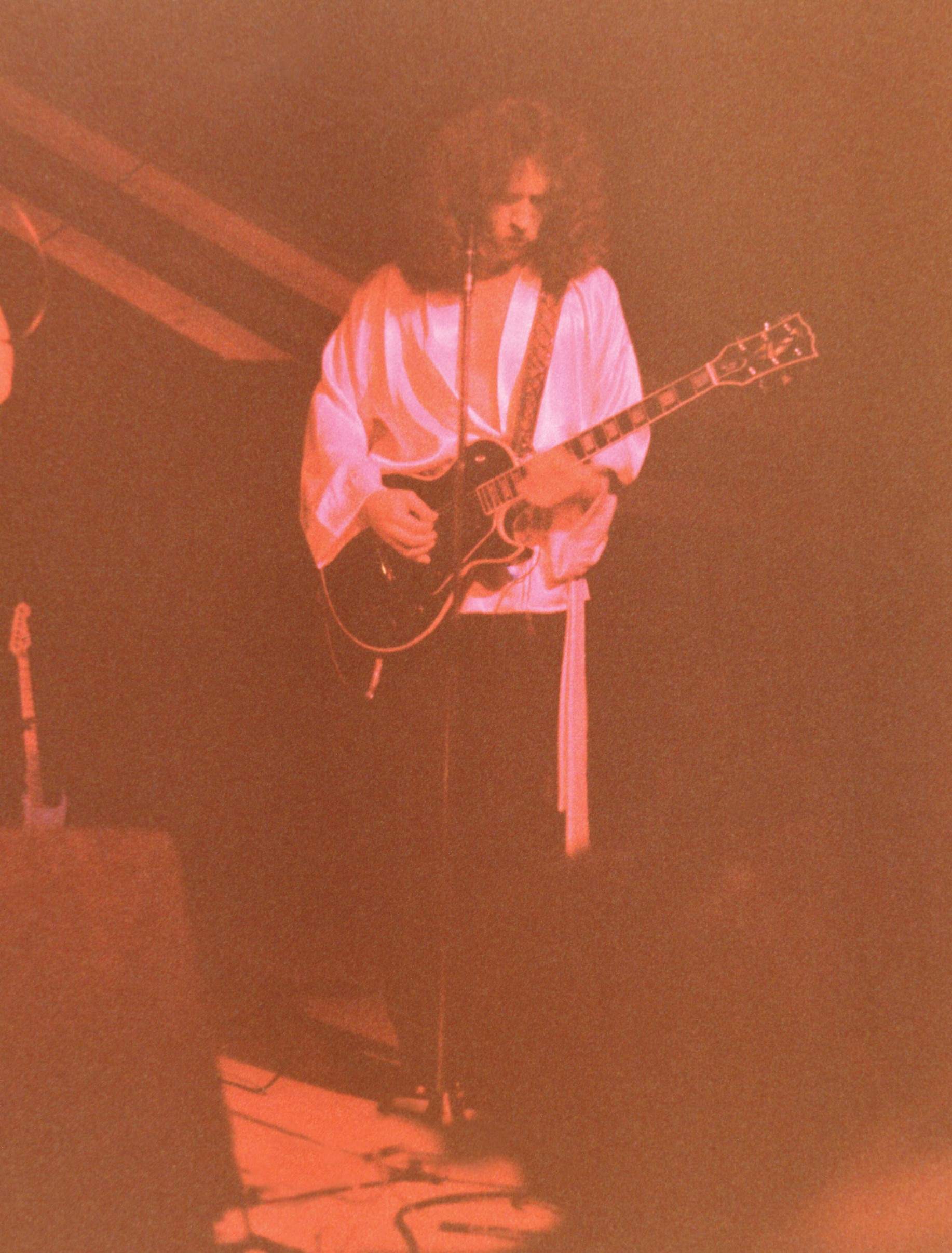
Why do you think you didn’t get signed by a label? Kim Fowley was interested in you?
English Cathy: Kim really liked ‘Crazy Ladies’ and had the idea of issuing it as a double-sided single. However, he wanted the band to shave their heads!! This was at a time where long hair down to the shoulders and beyond was prevalent. Joey adamantly refused to cut his hair and when I mentioned this to John recently he had no knowledge of Kim’s plan. We probably did not even mention it because Joey said NO!!!
I have managed many bands over the years and have come to the conclusion that there is absolutely no logic as to who gets signed. In the words of one A&R person “it didn’t tweak my interest”!
John Binkley: In retrospect, I think a number of factors contributed to not getting signed. Probably most important is that we didn’t have a strong regional following, which was the one factor that I was told tilted Epic in making their final decision. Beyond that, it may have mattered that we weren’t a “seasoned” band of professionals who had matured musically. We weren’t writing songs that were constructed or tempered to get airplay. We were just four guys exploring the world of monster riffs, heavy chord progressions and driving rhythms.
In our favor, we had great management with English Cathy to handle the business side of booking gigs and making contacts that would push us forward. And we had Kim Fowley, who from the first time he heard the band was a big believer in our potential and worked closely with English Cathy to promote us. Kim was directly responsible for bringing us to Epic’s attention. He was very well connected into the music industry in Los Angeles and had the ear of many A&R folks, but his main interest was in producing, and more importantly, publishing music. Kim’s involvement with the band continued beyond the demo, so we always felt like we had an inside connection into the record companies. Kim’s interest in projects I was involved with would continue beyond Sudden Death to Sky Fire and then Hammerhead over the next 4 years.
The cover used by Rockadelic really captures the vibe, don’t you think?
John Binkley: Definitely. For years I had idly searched the internet for band mates I had known and bands that I had been in. I’d searched for Sudden Death enough times to be discouraged by constant hits on Jean-Claude Van Damme’s movie of the same name and all kinds of medical syndromes. It was 2006 when I chanced on Rockadelic’s site. I saw the graphic and my heart sank, thinking that some other band with the same name as ours had done what we hadn’t been able to do. It was a weird feeling, like looking at an alternate reality. Here was an album by some other Sudden Death. Cool that they came up with the same name, and certainly that was a wicked album cover. But there was a sting to it: they had done what we had not been able to do.
Then I looked at the track list, and I was confused. Some of the titles were the same as ours, and some were different. Were these covers of our songs by another band? Was this some compilation under the Sudden Death name? There were 30-second snips of songs on the site, so I clicked on one that was for a song called ‘It’s Lonely Here,’ expecting to hear another band’s song. To my surprise and astonishment, it was our song, one I had written, properly named ‘Lament’. And just that quickly, I realized that this was our demo, found at last after 35 years. How great that our music had been given such a haunting cover photo. It still seems very appropriate, and gets quite a response from those who see it.
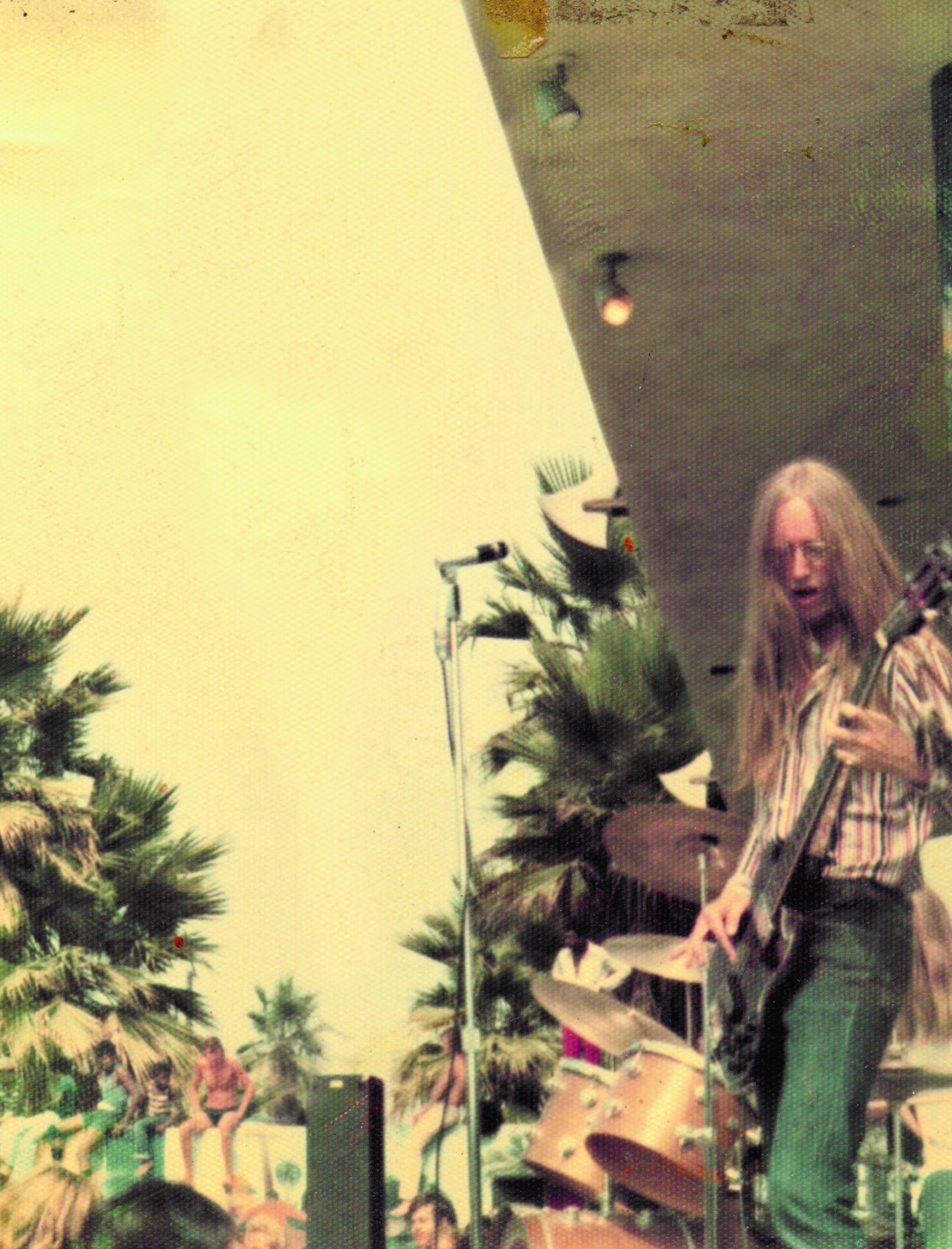
What sort of venues did you play? What are some bands that you appeared with?
English Cathy: A lot of clubs throughout Southern California. The Ice House in Pasadena, Under the Ice House in Glendale, Venice Beach House, many, many clubs all over Southern California. John knows them all!!
John Binkley: It’s a rather short list, since we didn’t have a recording contract and we weren’t your typical top-40 dance band, and we were never billed to any other band’s show. We pretty much loaded up our gear and played anywhere that would have us. That meant private parties – anything from a UCLA dorm party and the numerous parties at the South Pasadena rehearsal house, to a New Year’s Eve gig in the rec room at a large apartment complex. We performed at a couple of schools. At one, we played a junior high school assembly during the school day where the kids just sat in their seats and listened. What were they thinking? For another, we played an outdoor lunchtime set at my old high school, and on a sidewalk to publicize a sale at a retail store.
We did a lot of one-time auditions that didn’t lead to gigs, most notably at Gazzarri’s in Hollywood where Bill Gazzarri shut off the power to the band before we finished our set, and we had a handful of clubs that would book us repeatedly on their audition nights but not book us for weekend gigs, including The Corral (Topanga Canyon), The Beach House (Santa Monica), and Under the Ice House (Glendale). Then there were places like a bowling alley in Santa Ana that had been converted into a showcase venue, and numerous forgettable dives that were trying to carve an identity by booking something different. But we did build a following of sorts as we went along, and using a basic phone list we would spread the word about gigs (there was no internet in 1972), so by the time we made the demo we could draw a decent crowd at a club on a weekend with “our” crowd.
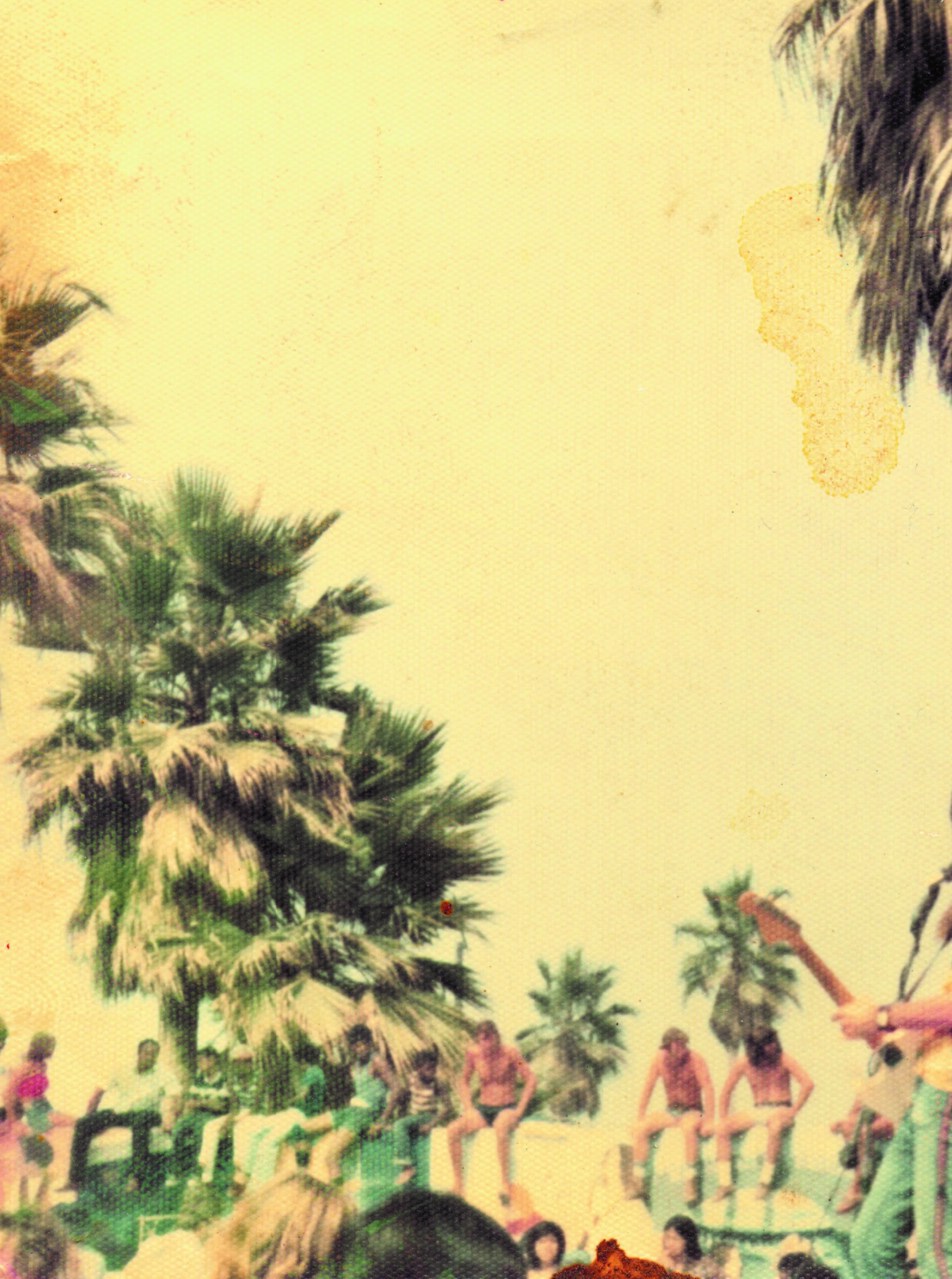
English Cathy: They were not an easy band to book during a time where everyone was playing top-40. So many times I was told they were “too psychedelic.”
“The principal came up and informed us that the police were getting complaints about the volume from 5 miles away”
Are there any crazy stories you would like to share with us?
English Cathy: Mainly the one where Joey went flying off the stage at a gig at Under the Ice House in Glendale. He was playing a hot lead and ran across the stage and did a cartwheel stage right and landed on the ground at the side of the stage and never stopped playing. Apart from a great rhythm section Joey’s guitar playing always seemed to take center stage.
John Binkley: Our gig at Pasadena High School was fun. We were on an outdoor stage, in an open quad, for lunch, and after 2 songs most of the large student body was packed in front of the stage. About 20 minutes into our 45-minute set, the principal came up and informed us that the police were getting complaints about the volume from 5 miles away. He looked at the assembled crowd and gave us a choice: turn down or play one more song and be done. For us, we weren’t about to turn down, so this was a no brainer. We jumped to the last song of the set, ‘Fugit Orchard’ and as the principal walked away I went all out into my feedback intro. Joey’s lead lasted almost 15 minutes.
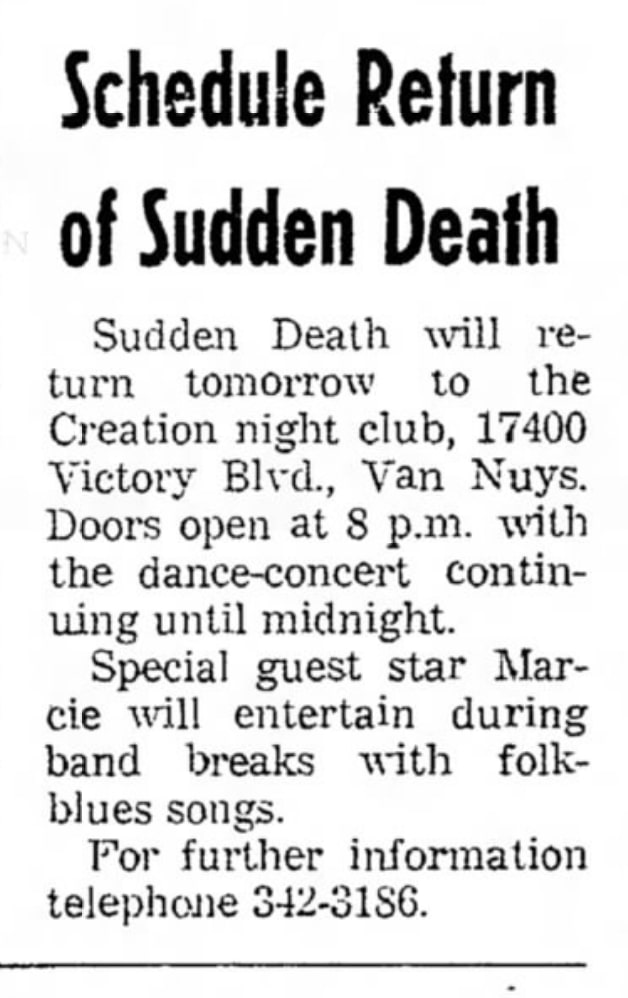
Were you inspired by psychoactive substances like LSD at the time?
English Cathy: Absolutely. There were a lot of psychedelics around!!!
John Binkley: They weren’t intrinsic to our live performance (unless you were in the audience), but they certainly played a part in influencing our musical direction and sonic goals. For my part, such substances were relegated to those times when I “really” wanted to listen to music for an evening, as a means of extracting deeper layers from the recordings of the core groups that I idolized, or to explore the creative experience with other musicians. It was something special, not an essential lifestyle element. However, the music I listened to had more of an impact sonically and emotionally under those influences, and that was something I felt inspired to try to recreate during my performances. I felt that trying to duplicate, through musical expression and performance, the exhilaration, ecstasy, and hypnotic impact of music at those extremes to a presumably “straight” audience would be taking the artform to a meaningful level. One way or another isn’t that what we are all trying to do?
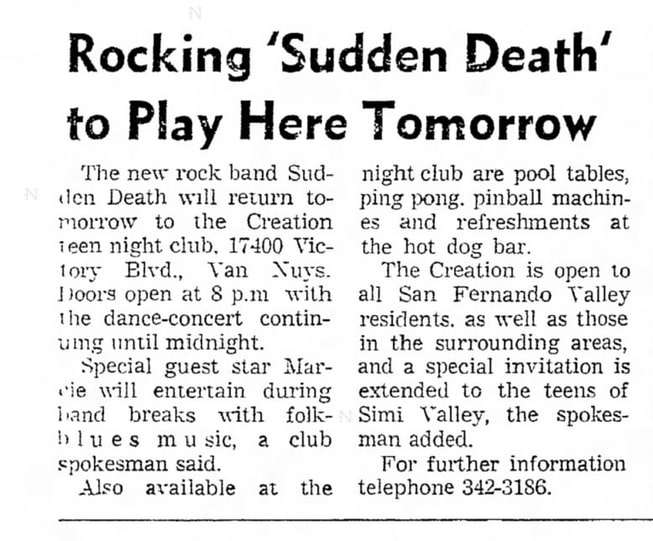
What about Hammerhead? You released a single with that band.
John Binkley: Hammerhead was put together by Terry Brent to hold and exploit Kim Fowley’s interest. Terry recruited me away from Sky Fire, the band Greg and Charlie and I formed when Sudden Death disbanded, which had lasted a year and played some memorable gigs. The rest of the Hammerhead’s original lineup featured Jeff “Austin” Addison on guitar, Woody Woods on guitar (who left the band shortly after its formation), and Greg Sanford (brother of Legs Diamond’s singer Rick Sanford) as lead singer. Hammerhead succeeded in being a hard-edged, high energy guitar centric cover band and quickly developed a large following playing at clubs all over the greater Los Angeles area. Highlights included doing numerous gigs at Gazzarri’s on the Sunset Strip with Van Halen, opening for Montrose at the Venice Beach Pavilion, and opening for Brownsville Station at the Starwood.
Kim collaborated with us to write ‘Summer Nites’ at an intense afternoon brainstorming session. In a matter of hours, the basics for the song were developed and we started performing it soon thereafter. Kim promoted us to GNP Crescendo Records, culminating in us being signed and recording ‘Summer Nites’ and ‘Jewels’ (the latter by Greg Sanford) at Gold Star Studios in Hollywood with Neil Norman (from GNP Crescendo) and Kim as producers. The single got airplay across the country in target markets, including Los Angeles, and there was talk of having us tour as the opening act for ZZ Top at one point, but it didn’t happen. Hammerhead was the hardest working club band I was ever in, and our ride lasted over two years.
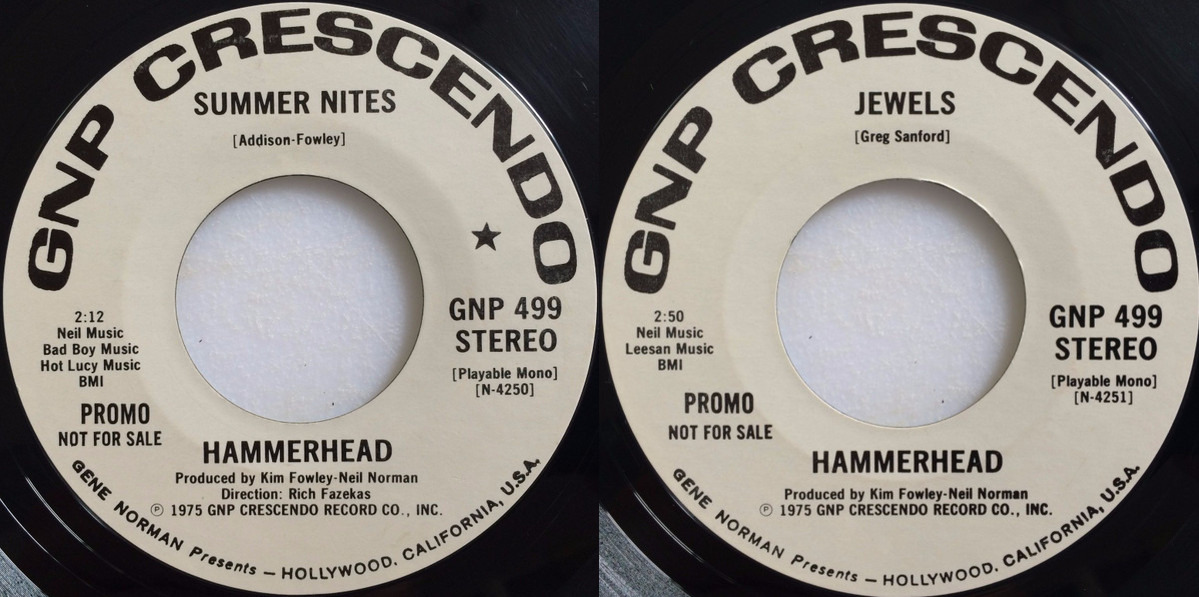
Sky Fire consisted of myself (bass), Greg Magie (vocals), Keith Winnovich (guitar), Dave Morgan (keyboards), and Charlie Brown (drums).
Hammerhead initially consisted of myself (bass), Greg Sanford (vocals), Jeff “Austin” Addison (guitar), Woody Woods (guitar) and Terry Brent (drums). Woody left the band a month or two after we started gigging. We looked for a replacement and wound up adding Jalon Lau on violin. Jalon was a master and it steered us a bit into a kind of classic rock/fusion feel, but Jalon left after a month or two. For the next couple of years we remained a 4-piece, which was our configuration when we signed with GNP Crescendo and recorded our single. Eventually, Austin left the band and was replaced by Bryce Mobrae (or Mobray) and we continued with him for several months. In a funny turn of events, the band notified me that they were going to replace me, but when no action was taken for several months I eventually gave them my notice and moved on. I’m pretty sure that broke the band up for good.
Is there any unreleased material?
John Binkley: Hammerhead had other originals, especially ‘Diamond in the Rough’ (again by Greg Sanford), but even though GNP picked up their option year on our contract, we didn’t record again. Austin has an 8mm film (no audio) of us when we opened for Montrose, and he has a separately recorded audio tape of the same gig that he captured on a portable cassette deck. That’s it as far as I know.
After Hammerhead broke up, Greg Sanford became lead singer in Xciter, George Lynch’s band, which included Mick Brown on drums. They made a great 6-song demo which included George’s own treatment of ‘Jewels,’ the B side to Hammerhead’s ‘Summer Nites’. Xciter broke up when George and Mick joined Dokken.
Looking back, what was the highlight of your time in the band? Where and when was your most memorable gig?
John Binkley: The highlight with Sudden Death? Working with 3 musicians who so infected me with the exhilaration of live performance that its momentum is still driving me, 50 years later. That, and experiencing the unreal dynamics that can be created between a band and its audience. Playing in Sudden Death allowed us to completely abandon ourselves to our creative instincts, and to brush elbows with a chance for real success.
Sudden Death’s most memorable gig? For me it was certainly the two-set show we did as a live audition for the Epic Records suits that Michael Sunday and Kim Fowley brought to town. The demo had been made and out of all the contending bands, it was down to an east coast band and Sudden Death. Who was going to be “America’s answer to Black Sabbath”? It happened at the (long gone) Beach House club in Santa Monica, on the beach adjacent to the (long gone) Pacific Ocean Park. It would have been in the summer of 1972. The club’s owner, Steve Parfait, was a fan of the band but wouldn’t book us at the club (“You guys are great, but…), but he let us come on audition night whenever we wanted to break in some new songs.
Kim had called English Cathy with the news that Michael Sunday and the Epic brass were coming to town to hear Sudden Death live. They were only going to be available on the weekend, so we needed to set something up. We could have used the house in South Pasadena, but we knew it would be better to play at a club. So we called Steve Parfait on a Sunday morning about doing 2 sets that night as an “audition.” Steve was already fully booked, but cancelled two bands to make room for us.
The phone list was put to work and when we showed up at the club several hours early, the parking lot was already full of fans. We unloaded our gear, did a quick sound check, and relaxed at the beach. English Cathy had coordinated an arrival time for the Epic entourage, so an hour ahead of them we did our warmup set of covers. Our covers, of course, were all Deep Purple, Uriah Heep, Black Sabbath, Humble Pie, and the like, and we tore into them with such intensity that English Cathy nearly stopped us half way through the set fearing that we would peak too soon.
The set brought the crowd to life and they were totally wound up by the time we finished. While we took a break to await the arrival of Michael and his guests, the crowd kept chanting for the band. When the execs arrived, Sudden Death took the stage.
Our set of originals that night was one of the most overwhelming experiences I ever had as a musician in a band. The crowd and the band morphed into an energy exchanging beast that kept demanding more and more, song after song. It was electrifying. Everything that made Sudden Death a serious contender came into focus. Greg’s vocals, Joey’s stunning guitar work, Charlie and I laying an energized foundation, all clicked. In that moment, Sudden Death showed what it could do to a crowd, large or small. For years after that gig, at clubs, bars, stores, and airports, I had strangers come up to me and tell me they had been there when Sudden Death played at The Beach House.
English Cathy: I always enjoyed working with them. We had a lot of fun!!
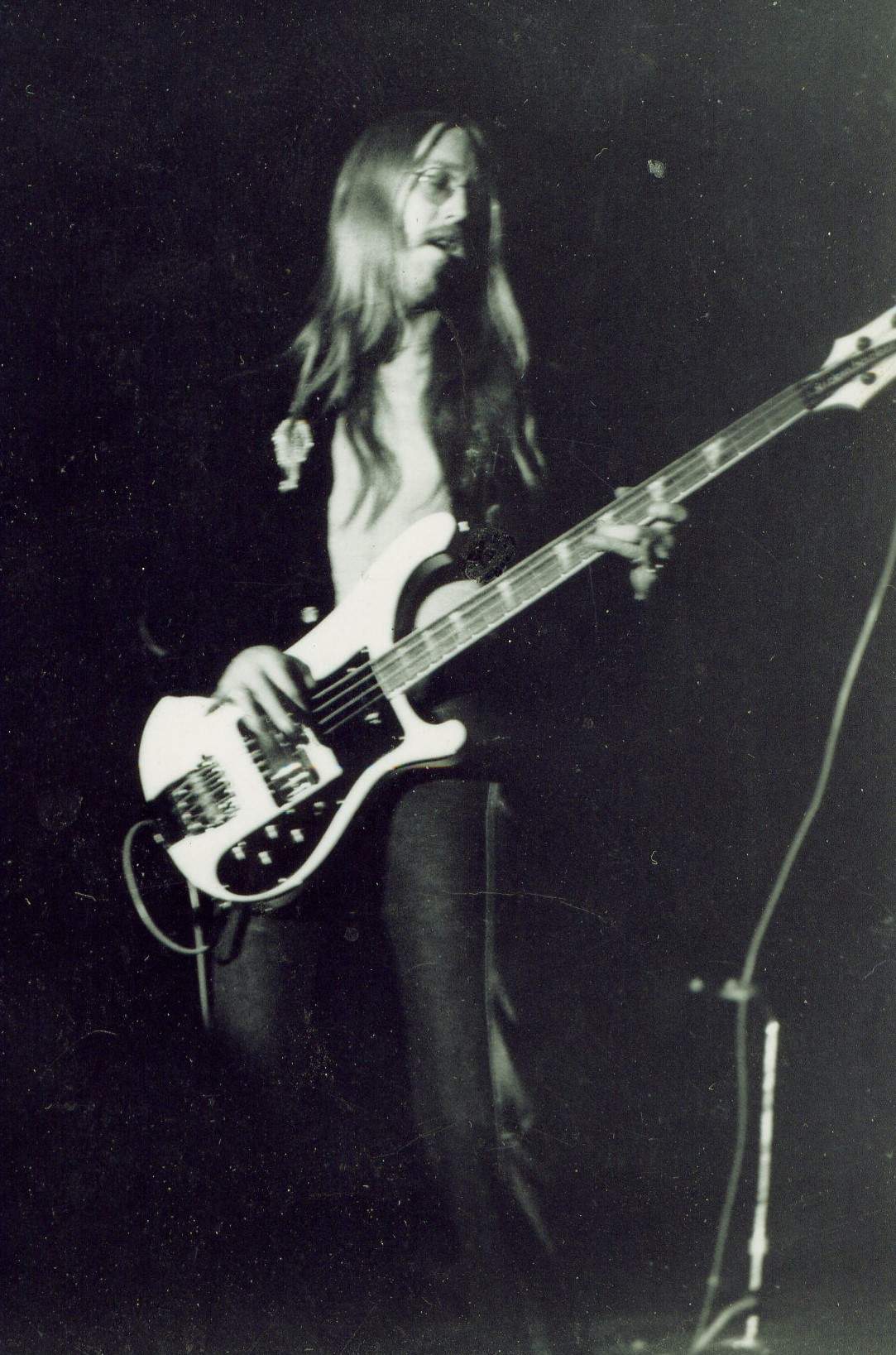
“Sometime, somewhere, someone is the greatest rock’n’roll band in the world!!!”
What happened after the band stopped?
John Binkley: Sudden Death reached a point where Charlie, Greg and I left in 1973 to form a toned down, more commercial approach to put ourselves into the clubs that had considered Sudden Death too loud, or too psychedelic. This was really born out of the fact that Sudden Death had lost out with Epic due to the lack of a regional following. Sky Fire was designed to fix that, and still capitalize on the Kim Fowley connection. Greg, Charlie and I found Keith Winnovich on guitar and Dave Morgan on a Hammond B3 (of course) rather quickly. Sky Fire avoided heavy metal originals and covers and devoted 60% of its repertoire to more centric rock, all while avoiding the songs everyone else was playing. We wound up playing a lot of places that wouldn’t hire Sudden Death. We wrote the song ‘Heavy Metal Kids’ which once again got Kim Fowley’s interest, but it never led to either a demo or a contract. Sky Fire played for a year, then I moved on to Hammerhead.
English Cathy: After Sudden Death, Joey and I went on to form a band named Polaris, kind of a David Bowie theatrical group with a great rock sound. They played the Starwood in Hollywood alongside Buckingham Nicks, just before they joined Fleetwood Mac. Once again a lot of interest but no signing.
John Binkley: Joey and I stayed in touch, and in 1978, about 3 years after Hammerhead broke up, he and I formed Temper with Dave Dickerson on drums and a steady turnover of singers who just didn’t fit. We had an arsenal of new originals and one of our singers made the effort to record a couple of them. The results were not all that great. Temper did some gigs but didn’t work steadily and we broke up after a year or so.
English Cathy: After Polaris broke up I parted ways with Joey. I worked with several other bands, including a young Van Halen, before moving to Oregon and briefly retiring from the music business. I relocated to Tucson, Arizona in the early eighties and continued managing bands and working in the music business as a consultant through www.transatlanticmanagement.com, but have somewhat “retired” again. I still stay in touch with most of the musicians I have worked with over the years.
I am now also a published author: www.findingfrances.net
Thank you for taking your time. Last word is yours.
John Binkley: That word would be “Thanks”. Thanks to you, Klemen, for your interest in bringing the band’s story to your readers around the world. Thanks to Adam Bennati, for tracking me down and then doing all the legwork to reunite me with Greg Magie and English Cathy, and for two years of continuous support in the effort to re-release the Sudden Death demo. Thanks to Tim Lavrouhin, who convinced me to try to be in a rock band, and to Terry Brent, who brought us to the attention of Kim Fowley, who brought us to Michael Sunday and Epic Records.
I want to thank everyone, past and present, who has taken time to listen to, and support, Sudden Death. I know there are faults in our demo that we have to own, but we did our best and we gave it our all, at a time in our lives when we hardly understood anything about the music business beyond loving music. We loved playing together, whether it be jamming in rehearsal or playing to the occasional club, packed or not, of fans, and we flirted with success that we all dreamed of. To think that 50 years later there’s an audience out there that appreciates what we did is stunning. And, especially, thanks to the unknown individual in New York who brought a lost tape to Rich Haupt and the folks at Rockadelic, who then gave life to our demo 23 years after the fact. Without it, I’d have never heard the demo again and we wouldn’t be talking about it now. Thanks for the fantastic ride.
English Cathy: Sudden Death was a great band and the fact that they were not signed does not deflect from how great their music and musicianship was. It is amazing that this tape has come to light and brought us back together after all this time…the music business is a crap shoot. I remember Robert Plant once said “sometime, somewhere, someone is the greatest rock’n’roll band in the world!!!”
It was an amazing time and it is great that this music has come to light. Thank you so much. I am pleased that the music tweaked your interest!!!
Klemen Breznikar
Ancient Grease Records Official Website / Instagram

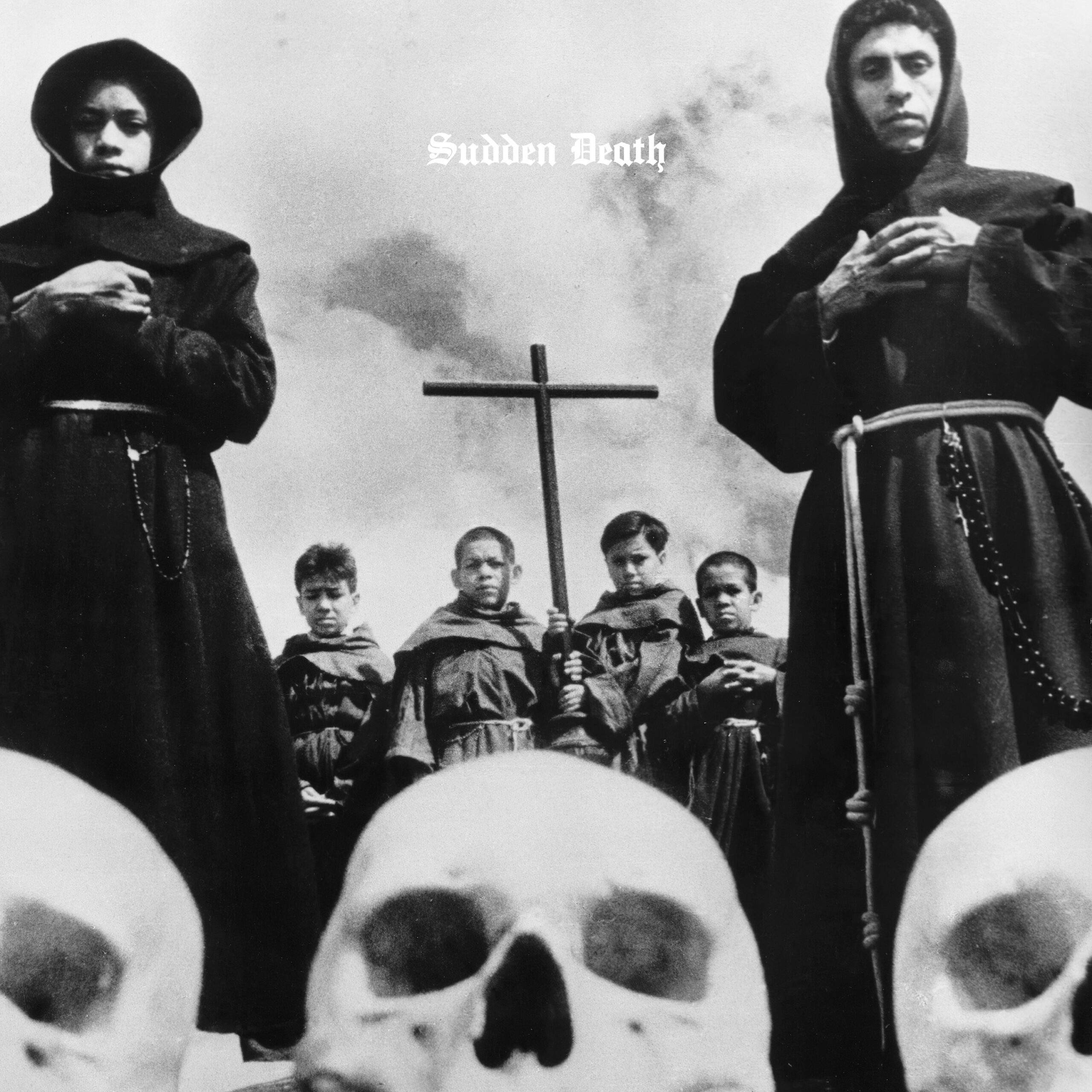
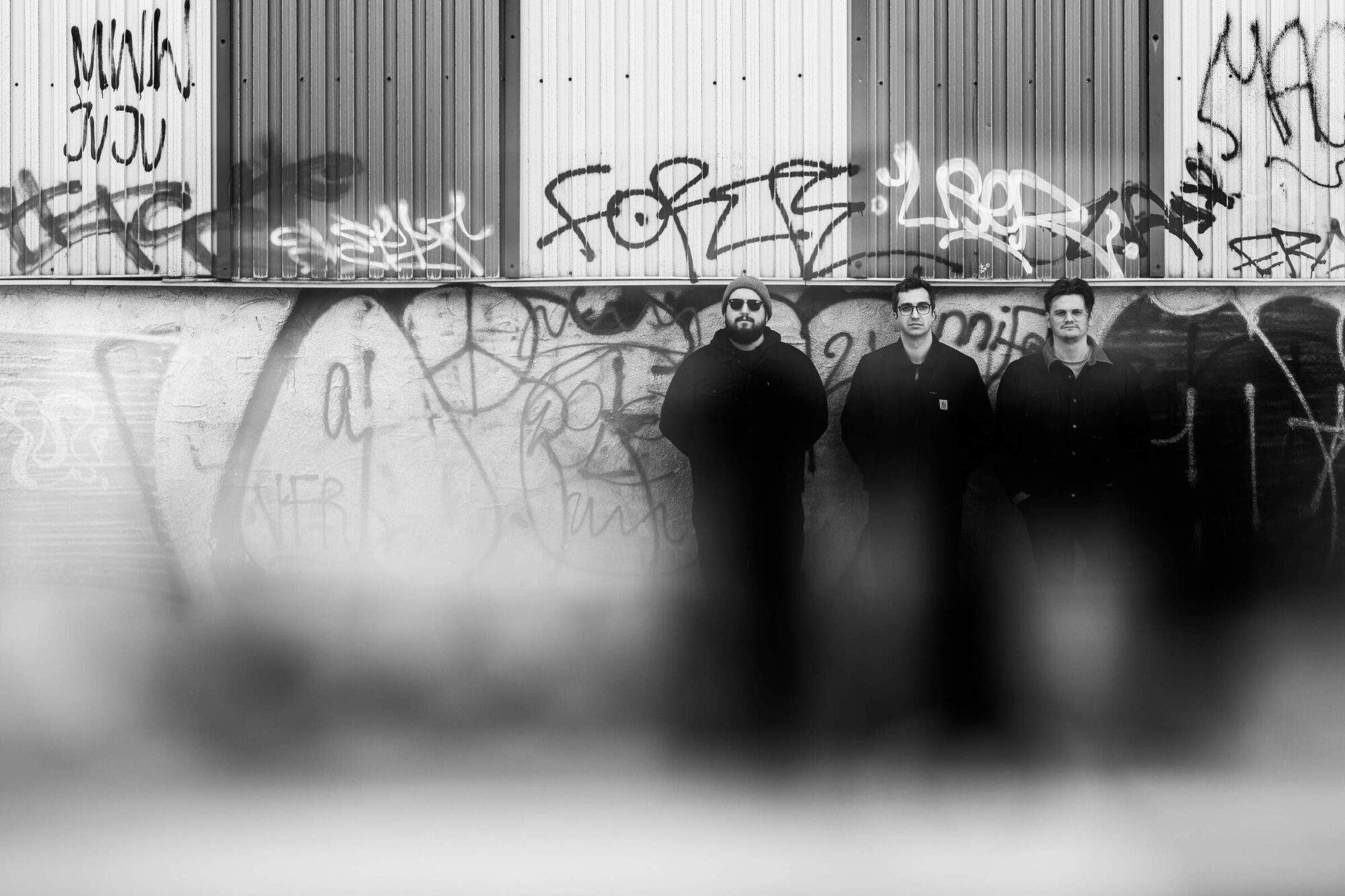
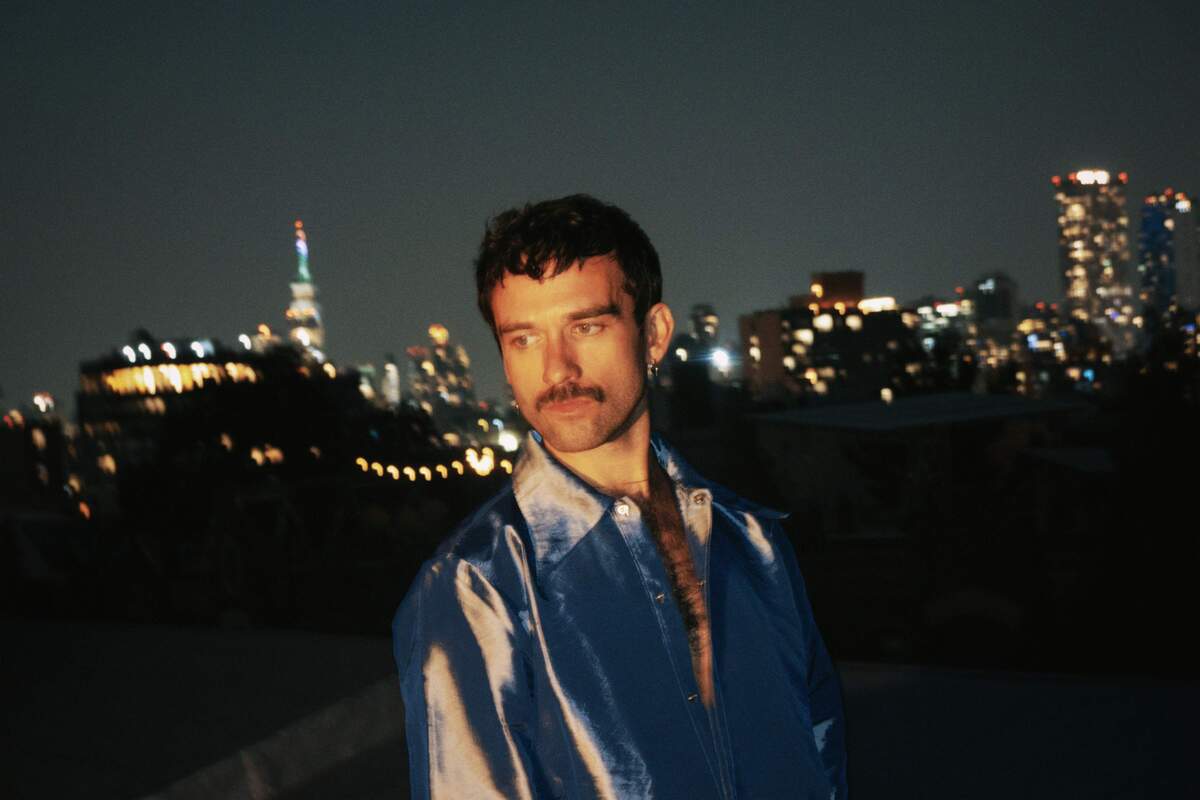
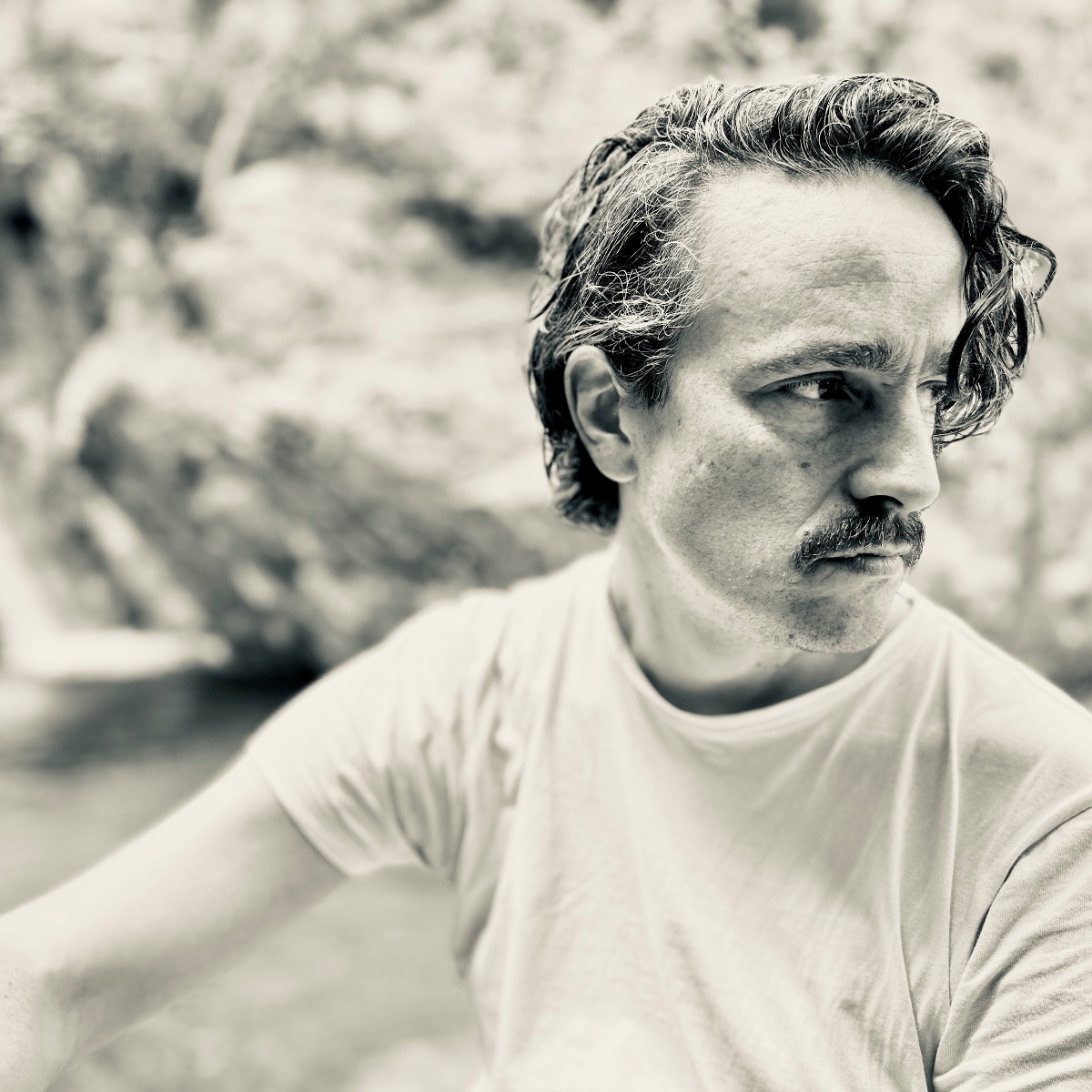
Thank you for the interesting and informative interview. Lucky that i bought the lp at a time when the price was still normal. Meanwhile one demands astronomical sums with excellent condition.
Fabulous interview.I only heard the Sudden Death demo album last year,but i’d read about it in a couple of psychedelic music reference books,Fuzz,Acid and Flowers by Vernon Joynson,and Acid Archives by the late Patrick Lundberg may have been the books a few years ago.BOTH rated this album very highly
I also found a cd issue released in 2021 titled”Suddenly…….Overtime”(Suddenly was NEVER mentioned to be the title,but Overtime WAS the working title) on a label called southside from Georgia,USA,(im in Edinburgh Scotland,how it found its way here,i dont know)this also features an interview with John Binkley from October 2007,over 7 pages,which was great to read and get the full story,as the information in the reference books i mentioned where limited.,but for a few years i’d really wanted to hear this demo album,so when i come across this cd,i was over the moon.I couldn’t wait to hear it for myself.Also the title” It’s Lonely Here” had its real song title “Lament”,so i was wondering if John Binkley had anything to do with this cd release?One thing wrong though unfortunately is the tracklist,is wrong on the back of the cd.
I was NOT disappointed,as i was expecting a lo fi recording,but this was studio quality,with the crunching guitar blasting out the speakers,and the vocals as clear as day,the bass thumping and the drums and cymbals not distorted or muffled.I WAS surprised at the quality of the recording,but saw Kim Fowley had produced it at CBS Columbia Studios,and was surprised Sudden Death did not go any further.As the late Kim Fowley had been in and around music and scenes for years,including during the psychedelic years,even appearing in the UK having dealings with Family and(Ambrose) Slade.
The music on this album is indeed heavy,even the Robert Plant like vocals on “The Zoo” of course reminds me more of Led Zeppelin than Black Sabbath.I DO hear both bands influence in this music.
Certainly for 1972,there are still slight remnants of psychedelia and acid rock,but certainly more amped up and doomy heavier sounding.”Leather Woman”also has the theremin making an appearance.
As for the artwork that this cd used,it IS fabulous,and gives a good impression of what to expect on the grooves,3 skulls,2 hooded adolescent monks with arms across their chest,flanked by 4 robed kids holding a wooden cross,a very dark cover,and rather menacing to boot,but is perfect for the music.So i’m assuming this IS the rockadelic creation?
AGAIN thank you for this interview,and its fab to also see English Cathy still going who DID go on to manage Mammoth,the pre Van Halen group.
Nice interview. I first listened to the group years ago (who wouldn’t with that arresting album cover?). It’s good it’s going to be reissued so more people will get to hear it.
Any chance of a reissue on cd? I almost got my hands on a copy recently on eBay but the seller couldn’t send it to me because of the tariffs. Bummer.